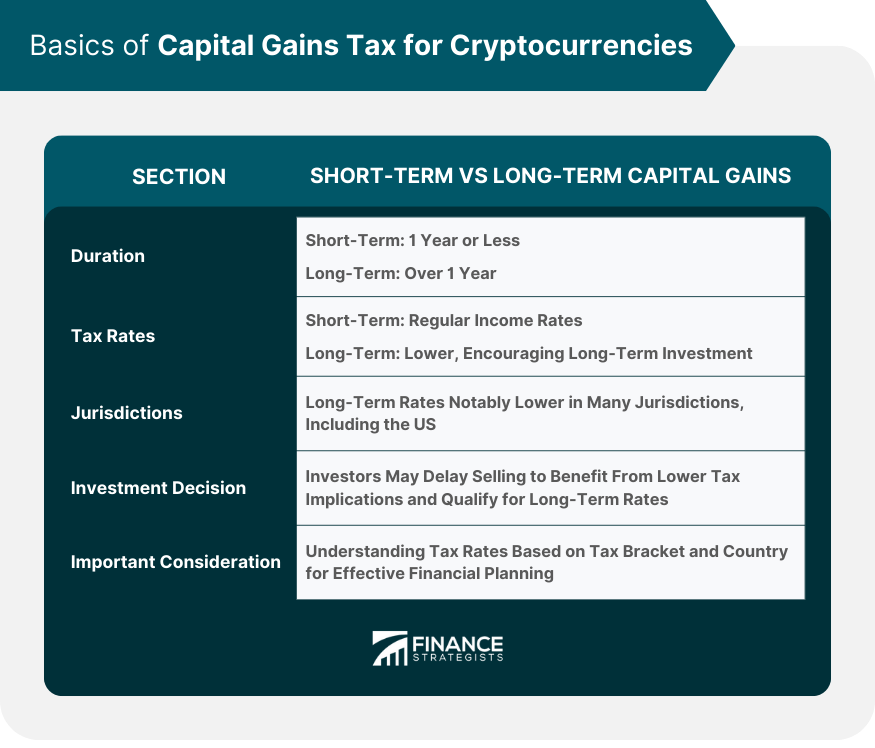Understanding how cryptocurrencies are taxed is essential for any investor aiming to stay compliant with tax laws. The nuances can become complex, but at its core, it revolves around capital gains. The duration you hold your cryptocurrency determines the kind of capital gain it incurs. Short-term gains result from assets held for a year or less, while long-term gains apply to assets held for over a year. Tax rates differ significantly between these two types. Short-term gains are usually taxed at regular income rates, which can be steep, while long-term gains often enjoy a more favorable rate, encouraging long-term investment. In many jurisdictions, including the U.S., the tax rate associated with long-term capital gains is notably lower than that of short-term. This difference can influence investment and selling decisions. Investors may delay selling an asset to benefit from lower tax implications if they're on the cusp of qualifying for long-term rates. Understanding the rates specific to one's tax bracket and country is essential for effective financial planning. Cryptocurrency, despite its decentralized nature, doesn't escape the watchful eye of tax agencies. Thus, determining your capital gains accurately is vital. Your cost basis is effectively what you paid for the cryptocurrency. It includes the purchase price plus any associated fees. For instance, if you bought a Bitcoin for $9,000 and paid a $100 fee, your cost basis is $9,100. When you sell, this number is crucial in determining your profit or loss. The simple formula is the Sale price minus Cost basis. If you sold that Bitcoin mentioned above for $11,000, your gain would be $1,900 ($11,000 - $9,100). This gain is what you'd report for tax purposes. One common misconception is that a crypto-to-crypto trade (e.g., Bitcoin to Ethereum) isn't a taxable event. It is. Even if you didn't convert to fiat currency, you have to calculate the capital gain or loss using the fair market value of the cryptocurrency you received. Hard forks, where a cryptocurrency splits into two, often lead to holders getting a new type of coin. This can be a taxable event. Airdrops, where holders get new coins (often due to marketing promotions), can also be considered taxable income, with the amount based on the fair market value of the coins at the time they're received. Mining crypto isn't just about discovering new coins; it's also a taxable event. The income from mining is often taxed at regular income rates, and once the mined cryptocurrency is sold, it's subject to capital gains tax. Staking, a process of participating in a proof-of-stake (PoS) system to get new coins, has similar implications. Gifting crypto might be a kind gesture, but it has tax consequences. In some jurisdictions, if the gift's value is above a certain threshold, it might trigger a gift tax. Inherited cryptocurrency, on the other hand, might be subject to estate taxes. With the growing acceptance of cryptocurrency, tax agencies worldwide are paying closer attention. Proper reporting is now more critical than ever. Most countries require taxpayers to report all cryptocurrency transactions. In the U.S., for instance, Form 8949 is necessary for detailing capital gains and losses. Keeping meticulous records of all transactions, including dates, amounts, and fees, can make tax time less daunting. Given the volatile nature of cryptocurrency prices, knowing the exact details can be the difference between a gain and a loss. Many exchanges now provide annual tax reports for users detailing all trades and transactions. These can be valuable resources for ensuring accuracy in one's tax filings. Skirting around tax obligations isn't advisable. The consequences can be severe, ranging from hefty fines to imprisonment. Penalties Associated With Non-compliance: Ignoring or underreporting crypto gains can result in penalties. Depending on the jurisdiction, these can range from fines to interest on owed amounts and even potential jail time. International Cooperation on Crypto Tax Evasion: As cryptocurrencies are borderless, international cooperation is growing. Tax agencies are sharing data and collaborating to ensure that individuals and businesses are paying their fair share. Smart planning can lead to reduced tax liabilities. Holding Periods to Qualify for Long-term Rates: Consider holding onto assets long enough to qualify for the more favorable long-term capital gains rate. This strategy can significantly reduce tax obligations. Tax-loss Harvesting: If you're sitting on cryptocurrency that has lost value, consider selling it to offset gains from other investments. This strategy, known as tax-loss harvesting, can reduce your taxable income. Gifting and Charitable Donations Using Crypto: Donating cryptocurrency to charitable organizations can lead to tax deductions. Similarly, gifting assets can be a strategy, but it's essential to be aware of any associated gift taxes. Taxation isn't just a local matter. With crypto being a global phenomenon, understanding the international landscape is essential. Each country approaches crypto taxation differently. While some might treat it as property, others view it as currency. Investors operating in multiple jurisdictions or considering relocation can benefit from understanding these differences. Tax treaties between countries can influence how crypto gains are taxed. Especially for those working or investing across borders, it's crucial to be aware of these agreements. Given the decentralized and global nature of crypto, creating a uniform tax regulation is challenging. Differences in regulations can lead to complexities, especially for those operating internationally. Cryptocurrency's growing prominence has seen a parallel surge in tax implications and regulations. The foundational distinction between short-term and long-term capital gains is critical, with significant tax rate variances based on the duration of holdings. Investors must grasp the intricacies of calculating gains, from understanding the cost basis to acknowledging crypto-to-crypto trades as taxable events. Activities like hard forks, airdrops, mining, and staking come with tax considerations. Proper documentation and reporting are paramount to avoid severe penalties linked to tax evasion. With international collaboration strengthening, the crypto landscape demands keen attention to evolving regulations across jurisdictions. While each country brings its perspective, global harmonization remains a challenge. In navigating this dynamic realm, astute strategies, such as tax-loss harvesting and understanding holding periods, can significantly impact tax liabilities. Knowledge is both power and protection in this ever-evolving crypto-tax world.Basics of Capital Gains Tax for Cryptocurrencies
Short-Term vs Long-Term Capital Gains
Tax Rates Associated With Each Type of Gain

Determining Capital Gains for Crypto Transactions
Initial Investment (Cost Basis) Determination
Calculating Gains or Losses
Impact of Crypto-To-Crypto Trades
Specific Considerations for Crypto Investors
Hard Forks and Airdrops
Mining and Staking
Gifts and Inheritance

Tax Reporting for Cryptocurrencies
Required Documentation for Reporting
Tracking and Organizing Transaction Records
Role of Crypto Exchanges in Tax Reporting
Crypto Tax Evasion and Its Consequences
Tax-Advantaged Strategies for Crypto Investors
Global Perspective on Crypto Capital Gains Tax
Comparison of Tax Regulations Across Major Countries
Tax Treaties and Their Implications
Challenges in Harmonizing Global Crypto Tax Regulations
Conclusion
Capital Gains Tax for Crypto FAQs
The distinction is based on the holding period of the cryptocurrency. If you've held the asset for a year or less, the gains are short-term. If you've held it for more than a year, the gains are long-term.
Yes, crypto-to-crypto trades are taxable events. You have to calculate the capital gain or loss using the fair market value of the cryptocurrency you received at the time of the trade.
Hard forks, where a cryptocurrency splits into two, can lead to a taxable event, especially if you receive a new type of coin. Airdrops are often considered taxable income based on the fair market value of the coins at the time of receipt.
It's essential to maintain detailed records of all transactions, including dates, amounts, associated fees, and the involved cryptocurrencies. Many crypto exchanges provide annual tax reports, which can assist in this process.
Yes, some strategies include holding onto assets to qualify for long-term capital gains rates, engaging in tax-loss harvesting to offset gains, and making charitable donations using cryptocurrency for potential tax deductions.
True Tamplin is a published author, public speaker, CEO of UpDigital, and founder of Finance Strategists.
True is a Certified Educator in Personal Finance (CEPF®), author of The Handy Financial Ratios Guide, a member of the Society for Advancing Business Editing and Writing, contributes to his financial education site, Finance Strategists, and has spoken to various financial communities such as the CFA Institute, as well as university students like his Alma mater, Biola University, where he received a bachelor of science in business and data analytics.
To learn more about True, visit his personal website or view his author profiles on Amazon, Nasdaq and Forbes.















